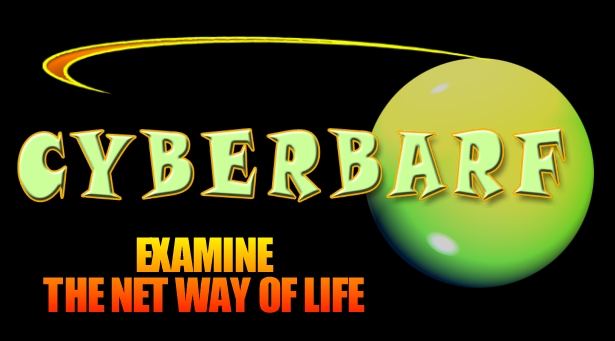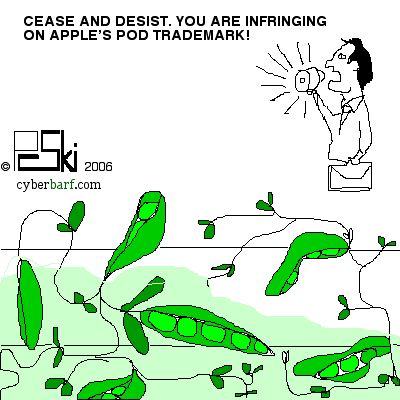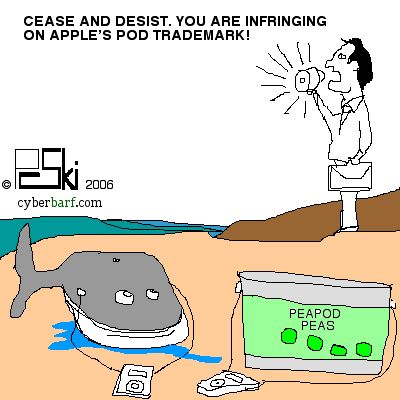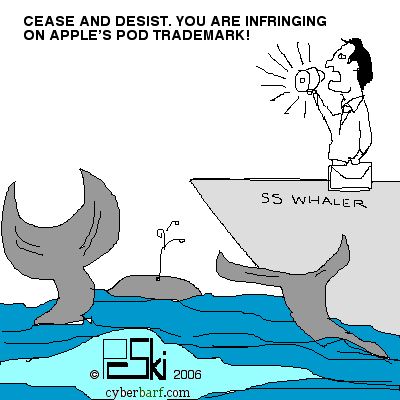cyberbarf
EXAMINE
THE NET WAY OF LIFE
Vol. 6 No. 3
October, 2006
BRAIN
SPLATTER EDITION
IN
THIS ISSUE:
PODS
iToons
on Pods
PRANK
PAGES
TOO
EASY
WEATHERING
THE MEDIA
THE
NEW OLD SALES ROUTINE
POKER
THEM WITH A STICK
iToon
on Day Laborer
THE
NEW WORLD
A
CYBERBARF
CYBERSPACE ODD-ESY
|
|


|

Don't forget to check
out the
CYBERBARF
BARF BAG podcast.
|
cyberbarf
EXAMINE THE NET WAY OF LIFE
BRAIN SPLATTER
1)
PODS
Rocky, our Tech
Guru, in between emailing sections of the Geneva Convention to the
publisher, sent in a few cyberbarf iToon ideas. Both dealt with the issue
of Apple Computer claiming the exclusive use of the term “pod”
for everything on anything
that may or may not be related to its popular iPod music player. First,
a pod of whales:
Next, a garden of peas:

The point is that there is an overzealous corporate legal
department sending letters to small and large manufacturers of iPod related
products, like iPod stands, iPod stereos, iPod accessories, and iPod connectivity
products telling them to change the name(s) of their products. Even though
the Apple store sells many of these items, Apple will argue that it is protecting
a valuable corporate asset, its trademark iPod, from becoming a common,
or generic term for a portable music player. This is not a new concept.
Xerox spent decades attempting to keep the term for photocopying from becoming
its corporate name. “Miss Secretary, could you please make a Xerox
of this letter for my file?” But that is the price of fame and fortune
in a mass media culture. The term takes on a life of its own, like the creature
Frankenstein made in his laboratory. Once its loose in the marketplace,
and into the culture, it cannot be readily controlled. Yes, companies do
associate accessories with the Apple product line. It probably helps both
in the long run; Apple continues to dominate the music player market, and
the accessory companies continue to make iPods easier to use which would
increase Apple sales. But in some corporate armies, there is a directive
to maximize any and all revenue streams, no matter how small, to add to
the bottom line that Wall Street dissects on a quarterly basis. There is
a common sense disconnect at times when corporate America tries to protect
its intellectual property.

An Illinois college student was suspended for posting
a fake web page on a female acquaintance. She was not amused by the
alleged exploits of the writer's imagination. When the comment section
piled on to the lie, the woman was not amused by the scandalous inferences
being made on this site. He thought she would know it was a joke. There
is a clear line between satire and slander. Ruining a person's reputation
because it seems like fun is not a defense to responsibility. Any person,
at any age, can become a national publisher because the broad distribution
channel of the internet. Social networking is far larger than the interpersonal
school days of today's tech savvy students. This is a formula for mischief
and potential disaster, because a dumb publisher may not realize that
a state's libel, slander and invasion of privacy laws apply to anything
he or she posts on the web. And if the butt of the alleged joke is damaged,
it could ruin a poster's life. Maybe it would be useful if the host
site providers or the schools have a course section on the responsibilities
of publishing pages on the web to forewarn would-be humorists of the
pitfalls of going too far.
It was reported in the United Kingdom that a three year purchased
a vehicle on eBay UK. Apparently, his mother left her computer on, and password
on her desk so her little tike decided to go shopping with mum's account.
The child purchased a gawd-awful looking pink minicoupe. The mother said her
child was very computer savvy at such a young age; and she thought it was
pretty funny that her tot could accomplish such a purchase on-line. Lucky
for her, the Seller of the vehicle did not force the sale through. The Seller
rescinded the deal and re-advertised the car on eBay. This story raises a
number of issues: first, how lax is a parent leaving their account passwords
in plain site? Second, how lax is the supervision of children when it becomes
to the Internet? - - - apparently low. (Remember the flack parental groups
gave television over its content and the demand for parental control units,
V-chips, to be installed in all sets?) Third, with the anonymous nature of
e-commerce, Sellers still would have a right to rely upon the password purchases
of the Buyers to force the sale through. If not, then this would create uncertainty
and possible unlimited buyer's remorse after a sale has been concluded, all
at the expense of a non-defaulting Seller.
4) WEATHERING
THE MEDIA
The key to modern communication is speed and accuracy. In
the media, because of the nature of business model, radio is still the fastest
medium for breaking news. Television needs a studio, and producers need video
or graphics to fill a screen. The Internet was supposed to rival radio on
the speed of reporting breaking events to the public. September in Chicago
is a month of weather transition, from hot summer to instant winter temperatures.
Local weathermen should know the climate changes that happen during this seasonal
transition. One evening, the local television forecast stated no rain was
in the forecast for the next 48 hours. Within 12 hours, the skies turned into
dark coal as a violent series of thunderstorms developed, causing tornado
sirens to blare several times. Now, by the time the thunder, and pelting rain
hit the area, the radio was behind, hedging slightly toward the possibility
of rain showers that evening. The radar image loops on Internet weather sites
clearly showed several waves of bad weather (red means bad on Doppler) crossing
the northern Illinois region all afternoon. You know when its bad when family
members are calling me at my office for weather information updates. My information
is more current than the radio newscasts. It goes back to the old adage: if
you want to know what the weather is like, stick you head out the window.
The newsradio started to catch up when callers began reporting circulating
cloud formations and heavy downpours flooded streets. But the radio information
on the violent storms was always 10 to 15 minutes behind the event. By the
time television caught the story, it was playing the recap like a Sunday night
sports anchor, showing the highlights of the storm's destructive path.
5) THE NEW
OLD SALES ROUTINE
A long time ago, salesmen went door to door attempting to
sell housewives products like vacuum cleaners, soaps, new roofs, siding, brushes
and other household items. The sales pitch was always the same banter that
it became a stereotypical comedy routine in films of the era. Since marketing
departments have taken control over the sales pitches, one would think that
the traveling salesman would be as antique as the Model T. Here is an example
of the modern pitch: a man makes an appointment to see a professional about
his library. Once inside the professional's office, the man opens up his briefcase
and begins to talk about the firm's web site needs; he is not there to sell
his company's regular publications, but its Internet services. He says he
can redesign your firm's web page, add more content, generate new client leads,
increase business and most importantly, get your name high up on the search
engine result pages. What the guy was really selling, in a pudding explanation
of variable terms, was Internet advertising. He was trying to get the professional
to bite on a search engine advertising program - - marketing, fishing, bumping
up site hits, casting a wide net in search for clients. There was no guarantee
that any service included in the pitch would work, but that is not the point.
The point was that the guy was selling anything an unsophisticated person
would buy under the banner of “needed Internet presence.” It is
the same gold rush territory analogy that major corporation bought into during
the 1990s where companies were sold on the idea of the Internet would be the
only place commerce would survive in the New Virtual World Order. Does this
old sales pitch still have legs? Probably, but it is a tougher sell as the
great rewards have never really materialized in the past.
6) POKER THEM
WITH A STICK
The World Series of Poker concluded its main event just shy
of 9,000 players vying for the $12 million first prize. It is no longer a
card tournament, it is marathon march through the jungle in search of a few
prized lottery tickets to fame and fortune. The rapid growth of the business
of high stakes poker has been the Internet Internet gambling is increasing
at rapid rate because of the ease of the point and click playing style of
the too-much-time on their hands gambler. There has been a huge influx of
college students, who spend hour upon hour on-line honing their poker schools
at virtual tables. These on-line players can gain a similar number of experience
(number of hands played against opponents) than it has taken the professional
poker player a lifetime to accumulate in smoke filled card rooms. The alarming
popular of Internet gaming as the federal government cracking down on Internet
gambling. Most people believe the government is making up the charges; but
the interstate transmission of gambling wagers has been illegal for generations
(remember the movie The Sting?) Gambling and prohibition went hand-in-hand
in the 1920s. Vice has always been a popular diversion for the working class
man. One complaint against the government cracking down on off-shore gambling
site operators is that those businesses do not pay taxes of earnings from
U.S. customers. In addition, US players are probably not reporting their winnings
to the IRS either, as that would be an admission of illicit conduct. Congress
is debating additional laws to cover any alleged loophole in the growth of
this gambling sector. Bank regulators are telling merchant bank clearing houses
that the use of credit card payments to Internet gambling sites could be treated
the same as money laundering. The pressure is on to corral the poker industry.
But it may be too late. Operators in the United Kingdom tell that the US is
behind the times. It has regulated Internet gambling licenses, which allows
the crown to take its tax cut like house with each wager. With televised million
dollar pay-days, and cheap buy-ins, the general public is always looking to
get in the ground floor for any easy "quick rich" scheme. Poker
seems to be the latest money-making dream for many wannabee millionaires.
THE
NEW WORLD
A CYBERBARF
CYBERSPACE ODD-ESY
The
Sultanate of Clintonia-Rogstaden
The global on-line gaming
experience has quietly exploded into a a bandwidth python of multi-hour,
multi-kingdom game spheres. Whether it is the team combat arena, or
the total simulated fantasy genre, more and more men and women are using
their free time to escape to a virtual world. As a result of our tech
guru's prodding suggestion, cyberbarf.com
has created Sultanate
of Clintonia-Rogstaden. Readers will have
a running update of the status of this virtual country;
get the backstories
outside the game's program. For example, check
out the images of the national currency. There will be inside jokes,
satire, humor and pulse of a real bizarre country. New features will
be added on a regular basis. So check out the cyber-soap opera of nation
building here at cyberbarf.com.
Your Interest
keeps this Site moving forward.
THANKS FOR SUPPORTING
US.
cyberbarf
eStore
cyberbarf
Distribution ©2001-2006
pindermedia.com, inc.
All Rights Reserved Worldwide.
THIS SITE IS POWERED BY
pindermedia.com,
inc.
Wasted
Time for Wasted Lives™









